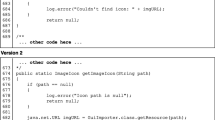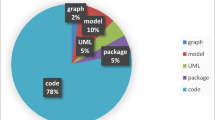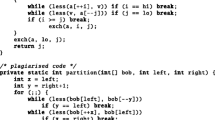Abstract
The clustering problem has an important application in software engineering, which usually deals with large software systems with complex structures. To facilitate the work of software maintainers, components of the system are divided into groups in such a way that the groups formed contain highly-interdependent modules and the independent modules are placed in different groups. The measure used to analyze the quality of the system partition is called Modularization Quality (MQ). Designers represent the software system as a graph where modules are represented by nodes and relationships between modules are represented by edges. This graph is referred in the literature as Module Dependency Graph (MDG). The Software Clustering Problem (SCP) consists in finding the partition of the MDG that maximizes the MQ.
In this paper we present three new mathematical programming formulations for the SCP. Firstly, we formulate the SCP as a sum of linear fractional functions problem and then we apply two different linearization procedures to reformulate the problem as Mixed-Integer Linear Programming (MILP) problems. We discuss a preprocessing technique that reduces the size of the original problem and develop valid inequalities that have been shown to be very effective in tightening the formulations. We present numerical results that compare the formulations proposed and compare our results with the solutions obtained by the exhaustive algorithm supported by the freely available Bunch clustering tool, for benchmark problems.
Similar content being viewed by others
References
Billionnet, A., Djebali, K.: Résolution d’un problème combinatoire fractionnaire par la programmation linaire mixte. RAIRO. Rech. Opér. 40, 97–111 (2006)
Chen, D.Z., Daescu, O., Dai, Y., Katoh, N., Wu, X., Xu, J.: Efficient algorithms and implementations for optimizing the sum of linear fractional functions, with applications. J. Comb. Optim. 9(1), 69–90 (2005)
Doval, D., Mancoridis, S., Mitchell, B.S.: Automatic clustering of software systems using a genetic algorithm. In: Proceedings of 1999 IEEE International Conference on Software Tools and Engineering Practice (STEP’99), Pittsburgh, PA, pp. 73–81 (1999)
Garey, M.R., Johnson, D.S.: Computers and Intractability: A Guide to the Theory of NP-Completeness. Freeman, New York (1979)
Gay, D.M.: In: IBM ILOG CPLEX, User’s Manual for CPLEX v12.1 (2009)
Golden, B., Raghvan, S., Wasil, E.: The Vehicle Routing Problem. Latest Advances and New Challenges. Springer, Berlin (2008)
Li, H.: A global approach for general 0–1 fractional programming. Eur. J. Oper. Res. 73, 590–596 (1994)
Mamaghani, A.S., Meybodi, M.R.: Clustering of software systems using new hybrid algorithms. In: Proceedings of 2009 IEEE International Conference on Computer and Information Technology (CIT 2009), Xiamen, China October, 20–25 (2009)
Mancoridis, S., Mitchell, B.S., Chen, Y., Gansner, E.R.: Bunch: A clustering tool for the recovery and maintenance of software system structures. In: Proceedings of 1999 IEEE of International Conference on Software Maintenance (ICSM’99), Oxford, pp. 50–59 (1999)
Margot, F.: Symmetry in Integer Linear Programming, 50 Years of Integer Programming. Springer, Berlin (2009)
Mitchell, B.S.: A heuristic search approach to solving the software clustering problem. Ph.D Thesis, Drexel University, Philadelphia (2002)
Parsa, S., Bushehrian, O.: A new encoding scheme and a framework to investigate genetic clustering algorithms. J. Res. Pract. Inf. Technol. 37(1), 127–143 (2005)
Praditwong, K., Harman, M., Yao, X.: Software module clustering as a Multi-Objective search problem. IEEE Trans. Softw. Eng. 37(2), 264–282 (2011)
Schaeffer, S.E.: Graph clustering. Comput. Sci. Rev. 1(1), 27–64 (2007). doi:10.1016/j.cosrev.2007.05.001
Síma, J., Schaeffer, S.E.: On the NP-completeness of Some Graph Cluster Measures. In: Wiedermann, J., Tel, G., Pokorný, J., Bieliková, M., Stuller, J. (eds.): Proceedings of the Thirtysecond International Conference on Current Trends in Theory and Practice of Computer Science, SOFSEM. Lecture Notes in Computer Science, vol. 3831. Springer, Berlin (2006)
Acknowledgements
This research has been supported in part by CNPq and FAPERJ (Brazil). The authors thank Ali S. Mamaghani and Brian S. Mitchell for providing the instances used on the computational experiments and thank the anonymous reviewers, whose comments greatly improve the structure of the presentation.
Author information
Authors and Affiliations
Corresponding author
Rights and permissions
About this article
Cite this article
Köhler, V., Fampa, M. & Araújo, O. Mixed-Integer Linear Programming Formulations for the Software Clustering Problem. Comput Optim Appl 55, 113–135 (2013). https://doi.org/10.1007/s10589-012-9512-9
Received:
Published:
Issue Date:
DOI: https://doi.org/10.1007/s10589-012-9512-9




